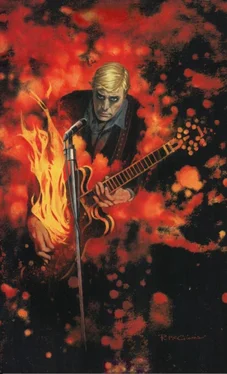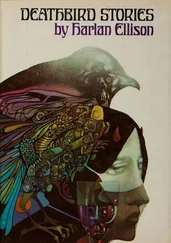Which brought forcibly home to Shelly how little anyone really was able to differentiate between strength and cruelty. He had only recently ingested the knowledge himself.
But Stag worked. Lord, how he worked!
Then, in the third week, with shooting ahead of schedule, the letter came from Louisville. It had been forwarded by Joe Costanza from the New York offices, the name familiar to him, but to no one else in the office.
After all, who had ever heard of Luther Sellers?
Shelly shuffled the letter out of the morning’s stack; he stared for a time at the return address and Luther’s name in Ruth Kemp’s handwriting (he assumed); a carefully-worked script that struck his memory as resembling the cards his first grade teacher had put on the blackboard illustrating how the letters of the alphabet were written. He considered opening it and reading the contents; he also considered burning the letter and flushing the ashes down the toilet, but thought better of it; if it was something that might touch Stag, then it might ameliorate the current tense situation. If it was bad news, then the little bastard deserved to suffer. If that was inhumanly possible.
He took the mail over at the noon break. The boy was having lunch with Leslie Parrish, his costar, in the studio commissary; when Stag saw his publicity man, the curling sneer appeared unbidden. “Well, if it isn’t my man Shelly. Whatcha got for me, guy?”
Shelly handed him the letter.
Stag’s grin melted away like mist on the moors as he read the return address. He fingered the short, squat envelope for a moment, then ripped it open carelessly. He unfolded the two sheets of note paper, a pink self-conscious shade that somehow seemed proper, coming from Ruth Kemp. He excused himself from the girl and she smiled briefly, politely, at Shelly before addressing herself to the pineapple and cottage cheese salad.
Stag read the letter, a tiny nerve in his jaw tripping. When he had read both sheets, he refolded them, put them back in the envelope, and tore the entire packet neatly in half. “So?” he said, turning an innocent expression on Shelly.
He handed the pieces to the older man and turned back to Leslie Parrish, his steak sandwich and his own world.
“So nothing,” Shelly answered, shrugging.
“So I’ll see you around.” Stag dismissed him without turning around. Leslie Parrish smiled briefly, politely. She looked uncomfortable.
Alone in Stag’s dressing room, Shelly fitted the pieces of the letter together. Once assembled, they read
Dear Luther,
Both myself and Mr. Kemp are very happy for the way you have been making such a success of yourself. Things here have not been so good as with you. Asa has been very sick, and to be truthful the doctors do not see much hope. The truth is that Asa is very sick and I don’t know how to put it down properly, but we are all afraid he will die. Luther, Asa keeps asking for you and if you can see your way clear to doing it for him, he loves you so, we have your old room all made up and it would only be for a couple of days. Do you think you can make it? He wants to see you so much Luther and it would make him so happy. I know we have no right to ask this of you as the last time we spoke it was not on the best of terms but this you can see is something that is breaking my heart. I am all alone Luther and as you know Asa and I have been hard pressed to make ends meet so every cent I have will have to go to make Asa comfortable for what ever time he has left—and after. I cannot write any more Luther except to beg you please to come to Asa now when he wants to see you so much. You know you are like a son to him. Please.
With love,
Ruth Kemp
Shelly read it over again. The jagged tear lines where Stag had ripped the letter only made it easier to read. There were smudges on the paper, and small wrinkled spots where Ruth Kemp might have cried. He pictured little Asa Kemp, lying in a big bed, alone, prepared to go, not too unhappy about it, except he wanted to see the boy he had taken in, and wondering what his wife would do now that he could not run the bicycle shop. It was every man’s inevitable finis, and Shelly could not work up too much sympathy, yet the callousness of the boy ignoring the letter made him queasy. Was such utter disregard for human emotions possible? Or did Stag feel a demand, a drag, from his past? Was all his callousness merely affectation, a bulwark against a return to the days and memories Stag hated and feared so much? Abruptly, Shelly remembered Stag’s words on the plane as they had left Louisville that first time:
Goodbye, you sonofabitch poor, goodbye.
How much fear could one mortal shell contain? Didn’t it reach a surface tension where it domed up and spilled over? Or was it like “hitting bottom"? No bottom, really, just falling and falling deeper and deeper, and never hitting the bottom that did not exist. Was it like that? Was fear like cancer? Could it rot someone out like a tree stump, like a rotten tooth, like rust on a piece of iron? Could it eat away all decency and leave something not quite human?
If it could, then Stag Preston was a prime example of the disease. “And somebody’d better get up a telethon for him,” Shelly concluded aloud.
He neatly whisked up the pieced-together letter and dropped it into the wastebasket.
That afternoon, on the set, Stag ran through a scene of deep emotion, with a quaver of sincerity and hopelessness in his voice that Shelly grudgingly admitted sounded honest as hell, without a drop of phoniness or “acting” in it. At one point Stag dropped out of character and politely, in a dulcet tone, asked the director if the phrase shouldn’t be put thus , rather than so , as the script offered it. The director snapped for his script girl, who came running, the place marked with a silver fingertip, and she stared over his shoulder as the page was studied. Shelly shivered inwardly as the director looked up with respect in his expression.
“Go ahead, Stag, try it that way; I think it’ll play.”
Stag read the line—no, that wasn’t right: he lived the emotion of the line—in his personal manner, and it added, it dragged from the prosaic script a nuance Shelly had missed completely when reading it.
Around the set smiles and nods of admiration came and went … leaving behind them another glowing facet of the legend.
Shelly went out and got very drunk. That night he found himself lying naked in a heap of four girls with unpleasant body odors, unclipped and straight hair, and fingernails bitten down to the quicks. When he extricated himself, smelling musky and like the aftermath of something he had never known existed—dirty sex—he put on his clothes and staggered out of the North Beach bohemian pad. How he had gotten there he never knew. His car was nowhere in sight. He was broke, save for twenty-four cents caught in the turned-around lining of his left pants pocket.
He used a dime of the money to call Carlene collect. There was no answer at the apartment. He managed to get a cab that drove him back to the bungalow he rented; and the owner, recognizing his tenant, paid the cabbie, put it on Shelly’s bill, and half-carried the exotic-smelling publicity man to the proper bed. He undressed him to his shorts, slipped Shelly between the cool sheets, and shut off the lights on his way out.
But Shelly was not asleep.
Drugged by dissipation, gagged by remorse and the itch of new ethics, sour stomached with the realization that Life Is Not A Fountain, and bewildered by the disappearance of the creature who had been Sheldon (I Want Mine) Morgenstern. But not asleep.
Never asleep.
Cerberus standing guard to insure no one’s entering the gate of Stag Preston’s evil.
Ever-faithful, hammered out of his nut, grin as big as all outdoors Sheldon Morgenstern, whose Poppa said a kaddish for a dead son gone to Hell in Hollywood. But not asleep.
Читать дальше












